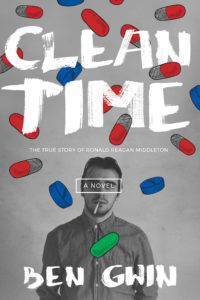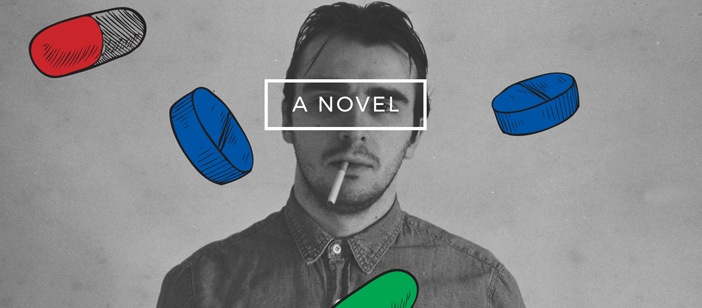Framed as the drug-addled memoir of addict-turned-reality TV star Ronald Reagan Middleton (annotated and published by floundering doctoral candidate Harold Swanger), Clean Time is a darkly comic satire set in a near-future America ravaged by addiction.
Ben Gwin’s writing has appeared in The Normal School, Mary: a Journal of New Writing, Bridge Eight, Thin Noon, Belt Magazine and others. He’s taught creative writing to inmates in the Allegheny County Jail, and to veterans in the Pittsburgh VA. He lives in Pittsburgh with his daughter.
Don’t miss out: Gwin will be launching Clean Time at White Whale Bookstore on May 12 (and will also be reading at Free Association @ City of Asylum on May 20).
“Ben Gwin writes like F. Scott Fitzgerald high on meth and Clean Time is The Great Gatsby for a generation that thinks fame is the answer to every question.”
– Lori Jakiela“Clean Time is an exuberant debut from novelist Ben Gwin, a satirical vision of the American nightmare that’s a pure joy to read. Like a Nabokovian Eddie and the Cruisers, Gwin’s novel goes in search of the missing Ronald Reagan, break-out star of The Recovery Channel’s hit reality show Clean Time, and finds instead an America gone off its meds. Clean Time is a darkly comic odyssey through a land of serial killers, hipster poets, and Bob Seger.”
– Kristofer Collins,Caliban Book Shop“Read Clean Time. It is many things; dark, inventive, hallucinatory, funny as hell, but above all just hard to put down. And like all journeys worth taking, you won’t always know where you’re headed, but do so with Gwin and you will be rewarded for it.”
– Adlai Yeomans, White Whale Bookstore
THE GREYHOUND TO ATLANTA
 I‘ve been up since yesterday and I’m covered in sweat and pond water. I take off my shirt and try to hang it out the window to dry but it drops and disappears under the bus. My ribs are covered in strange bruises. The bridge rattles as we cross it, heading toward the highway and the promise of a fresh start. Five miles from the interstate we brake so hard my head slams into the seat in front of me. Up ahead there’s a roadblock, and the bus falls in line with cars stuttering through the checkpoint. We come to a complete stop. Justin’s framed perfectly in my window, cut open and hanging from a tree in his front yard.
I‘ve been up since yesterday and I’m covered in sweat and pond water. I take off my shirt and try to hang it out the window to dry but it drops and disappears under the bus. My ribs are covered in strange bruises. The bridge rattles as we cross it, heading toward the highway and the promise of a fresh start. Five miles from the interstate we brake so hard my head slams into the seat in front of me. Up ahead there’s a roadblock, and the bus falls in line with cars stuttering through the checkpoint. We come to a complete stop. Justin’s framed perfectly in my window, cut open and hanging from a tree in his front yard.
I want to puke, but I haven’t eaten so it just comes up as stomach acid. I swallow and whisper to myself, “What did you get yourself into?” I can’t comprehend all the blood. Not just pooling beneath him, but everywhere. I want to look away, but can’t. I watch him float above a ring of police and reporters. He’s wearing one red slipper and the jeans Jacky and I gave him for his birthday — thirty or thirty-one. And there’s so much blood. Like it couldn’t have come from one person.
I bang on the window and scream, “You stupid fuck.” I didn’t even like Justin all that much, but I start crying and can’t stop.
It gets real quiet real quick and everyone stares at me. Face pressed to the window and bawling. My back sticks to the seat when I try to slouch out of sight. The bus jerks ahead and stops again. The driver opens the door, and a cop wearing big sunglasses steps inside. He calls my name. I do nothing and he calls it again.
We can do this the hard way or the easy way. I’m trying to figure out how they know I’m here, what they think I’ve done. I stand and push my shoulders back.
“What?” I ask and wipe my eyes.
“Need a word with you,” the cop says, and I swear he’s the tallest human I’ve ever seen.
The dull cabin sparkles in the light of emergency vehicles. The cop smiles. His mirrored lenses hold my reflection, and I know there’s no way I’m getting to Georgia.
FOREWORD
The previous passage was pulled from the memoir of my former student, Ronald Reagan Middleton. For the uninformed, Ronald Reagan Middleton is a man who, on live television, discovered our nation’s dreams of redemption and expressed the essence of these dreams in such a manner that he allowed us, the viewing public, a better understanding of the human condition. He took on the national media, escaped a serial killer, and subverted a pharmaceutical conglomerate. During his time in treatment for methamphetamine addiction, he saved the lives of at least two counselors and one patient.
The importance of Ronald Reagan’s journey as it relates to present day American storytelling and culture cannot be understated. America desperately needs a hero, a figure to look to in these turbulent times marred by political strife, class struggles, and rampant drug addiction. A flawed hero who encapsulates what is possible in this great country. One whose tale does more than perpetuate the common anti-hero narrative. A number of academic papers written on reality television and reality television stars, well received inside the academy but inaccessible to the general public, have not touched on any of these parallels. Further, Ronald Reagan has been the subject of several authorized and unauthorized-made-for-TV movies, a novelization of his time in rehab, and countless think pieces and essays. While these renderings of Ronald Reagan’s life are not without merit, I feel they have glossed over his spiritual growth and perseverance, as they pertain to his role as a contemporary mythological figure. In response, I have tried to contextualize these feelings in my presentation of his own words, which are published here for the first time.
The following memoir is Ronald Reagan Middleton’s chronicle of the many battles he waged against various addictions, compulsions, and institutions. Before he went missing, Ronald Reagan gave his memoir to his writing mentor, Sophia Trent, who in turn, mailed it to Ronald Reagan’s younger brother, Robert “Bob” Middleton Jr., with instructions to travel to the town of Booth, North Carolina and locate Dr. Blank to help prepare the memoir for publication.
I am Harold Swanger, MA, three semesters to PhD, Adjunct Professor of Classics and Humanities.1
While often misguided, Ronald Reagan was one of my brightest students. His journey encapsulates all that is possible in contemporary storytelling. His is the tale of an addiction laid bare. Recovery rendered through raw narrative power. A triumph of the American spirit. Above all, Ronald Reagan Middleton’s story offers hope.
THE ARRIVAL OF THE MANUSCRIPT
I’d recently moved into Dr. Blank’s old office and inherited his course load and research assistant, though she was soon fired due to budget cuts. The only good to come of this was the ability to use her desk to hold my first editions, and the box of Ronald Reagan’s old term papers, which I’d found while rummaging through Dr. Blank’s trash upon his dismissal. That winter, I spent countless hours in my office studying tapes of Ronald Reagan Middleton’s time on television. One evening, while engaged in this very activity, I heard a knock on my door in the Guilford State University Classics Department.2
After ignoring the knocking for several minutes, it became apparent the caller would not leave. I opened the door. There stood Bob Middleton, Ronald Reagan’s younger brother, in the narrow hallway, holding a Brewtown Ice box filled with tattered manila envelopes and composition books. I recognized him immediately. He bore a striking resemblance to Ronald Reagan before he’d dyed his hair and began donning a series of disguises.
“Are you Dr. Blank?” he asked.
“Yes,” I said.
Though Dr. Blank had been fired nine months ago, his nameplate still hung from the door. It was a bad habit, impersonating Dr. Blank, which I mainly did out of boredom, but in retrospect, I’m glad I did. Not until later would I reveal my true identity to Bob. Once I realized what he’d brought me, there was too much at stake.
A NOTE ABOUT THE ASSEMBLY OF THE MANUSCRIPT
I must reiterate the incoherent state of the package upon its arrival—not much more than a box of notebooks filled with barely legible scribbling and a set of twelve audiotapes wrapped in a blue rubber band.
As primary editor (with Bob’s assistance, of course) I have not altered the content of the original manuscript in any way, though we were at times forced to piece together a linear narrative using a mix of audio and unpolished writing (what appear to be drafts that RR never revised). Any other alterations or deviations have been noted in their respective sections.
Bob and I spent the winter transcribing this work and the spring and summer fact checking. We contacted and met many of the people mentioned or alluded to in Ronald Reagan’s memoir. In some cases, names had been changed. In others they had not. This decision seemed arbitrary on Ronald Reagan’s part. We’ve included some of our interviews, as well as relevant excerpts from Clean Time scripts, between scenes in the memoir to further contextualize Ronald Reagan’s story. Commas and other punctuation have been added, in places, for clarity.
We also reviewed the security footage of his time in jail and spoke with several of his aforementioned associates, many of whom were not directly quoted. Unfortunately, Mr. and Mrs. Middleton were unavailable for comment.
Nearly a year after completing his memoir, Ronald Reagan has not yet surfaced.
Endnotes
1 Technically the manuscript was bound for Dr. Blank, RR’s mentor and the professor under which I was a teaching assistant. However, Dr. Blank had been let go due to budget cuts.
2 The running joke in the department is that my office is the department. We’d been under strenuous budgetary restrictions, and the President, Dr. Penny Evergreen, promised she would “allow me to pursue other academic opportunities if [I] did not change the prudent nature of [my]productivity.” While I asserted that quality publications and research take time, she stood fast in her demands that I publish quickly. Despite my insistence that inter-institutional politics stood in the way of publication, she only granted me four semesters to produce a work that would put Guilford State back in the discussion of the top liberal arts college and universities. Unfortunately, this led to a fog of depression, which I was unable to cure, that prevented me from doing little else but spend nights in my office with my ancient television and count down the days until my termination. I had hit bottom. But when Bob Middleton Jr. arrived with his brother’s memoir, I was offered a way out.
Excerpted from Clean Time by Ben Gwin. Copyright © 2018. Excerpted by permission of Burrow Press. All rights reserved. No part of this excerpt may be reproduced or reprinted without permission in writing from the publisher.

























